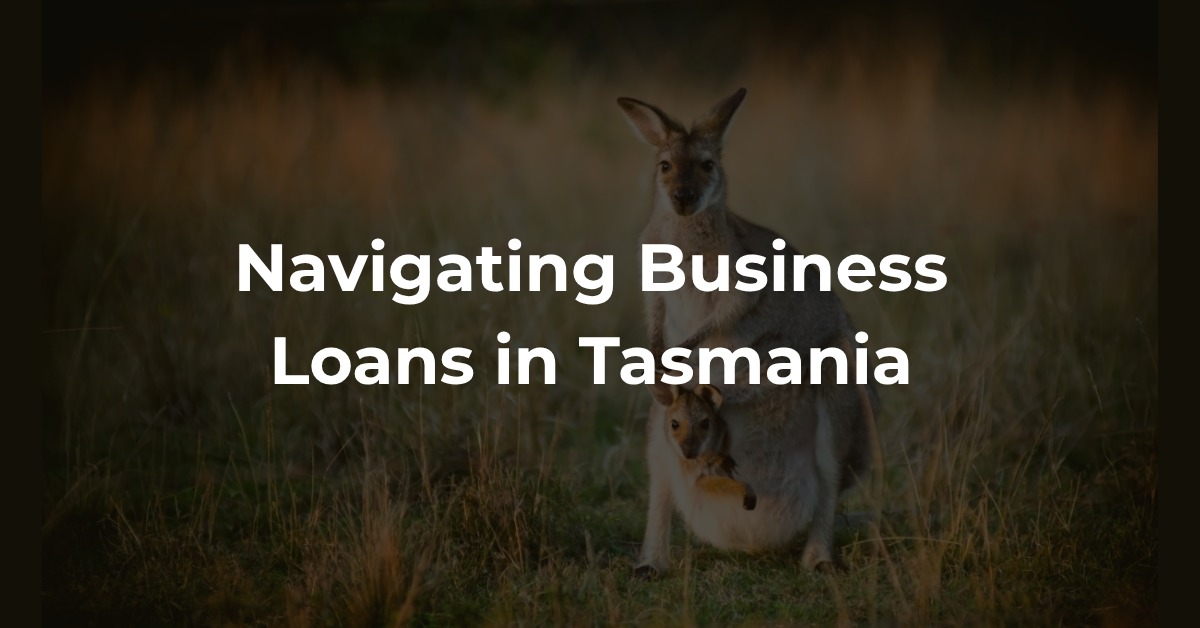Navigating the world of business loans in Tasmania can be a crucial step for small business owners and entrepreneurs seeking to grow and sustain their ventures.
With a variety of financing options available in Tasmania, understanding the nuances of small business loans in the region is essential for making informed decisions.
Whether you’re exploring loan options in Tasmania to expand operations or seeking startup funding to launch your entrepreneurial dream, finding the proper financial support can significantly impact your business’s success.
This guide aims to provide practical insights and advice, empowering you to pursue the financial resources that best fit your needs confidently. Let’s explore how you can strategically access the funding opportunities that Tasmania offers to foster your business growth.
Note: You can get your free PDF guide on tips for getting a business loan below.
Understanding Business Loans
Business loans are a vital tool for entrepreneurs in Tasmania. This section explores the various types of loans available, eligibility requirements, and the benefits they offer to businesses.
Types of Business Loans
Business loans in Tasmania come in various forms, each designed to meet specific financial needs. Term loans are a standard option, providing a lump sum to be repaid over a set period with interest.
Line of credit loans offer flexibility, allowing businesses to draw funds as needed up to a predetermined limit. This type of loan is beneficial for managing cash flow or addressing unexpected expenses.
Invoice financing is another option, where businesses can borrow against unpaid invoices. This can help bridge gaps in cash flow while waiting for customers to pay.
Equipment loans are specifically tailored for purchasing business-related machinery or tools. These loans often use the equipment itself as collateral, potentially offering more favorable terms.
Eligibility Criteria for Loans
Lenders in Tasmania typically assess several factors when determining loan eligibility. A strong credit score is often a key requirement, as it demonstrates a history of responsible financial management.
Business performance is another crucial factor. Lenders will review financial statements, including profit and loss reports and balance sheets, to gauge the business’s health and ability to repay the loan.
Time in operation is also considered. Established businesses with a proven track record may find it easier to secure loans compared to startups.
Collateral may be required for certain types of loans. This can include business assets, property, or personal guarantees from the business owner.
Lenders will also evaluate the purpose of the loan and how it aligns with the business’s growth strategy and potential for success.
Benefits of Business Loans
Business loans can provide the capital needed to fuel growth and expansion. This might involve opening new locations, hiring additional staff, or investing in marketing efforts.
Loans can help businesses manage cash flow more effectively. By having access to funds when needed, companies can bridge gaps between expenses and income, ensuring smooth operations.
Taking out a business loan can help build a company’s credit profile. Consistent, timely repayments can improve the business’s creditworthiness, potentially leading to better loan terms in the future.
Loans can also enable businesses to capitalize on time-sensitive opportunities. Whether it’s a bulk purchase discount or a strategic acquisition, having quick access to capital can be a game-changer.
Ultimately, business loans can serve as a financial buffer during challenging times, enabling companies to weather economic downturns or unexpected setbacks.
Navigating Tasmania Financing
Tasmania offers a range of financing options for businesses. This section delves into the key financial institutions, local government initiatives, and community lender options available in the region.
Key Financial Institutions
Tasmania’s financial landscape includes a mix of national banks and local credit unions. Major banks like Commonwealth Bank, ANZ, and Westpac have branches throughout the state, offering a wide range of business loan products.
Local institutions such as MyState Bank and B&E Personal Banking provide more personalized service. These organizations often have a deep understanding of the local business environment and may offer tailored solutions.
Credit unions, including Tasmania Police Credit Union and Spirit Super, are member-owned financial cooperatives. They typically offer competitive rates and may be more flexible in their lending criteria.
Online lenders are also gaining popularity. Platforms like Prospa and Moula offer quick application processes and fast funding, which can be beneficial for businesses needing urgent capital.
Local Government Initiatives
The Tasmanian government offers several programs to support business growth. The Business Growth Loan Scheme provides low-interest loans to eligible businesses for expansion and job creation.
The Tasmanian Development Board administers various grant programs. These can include funding for innovation, export development, and skills training.
Local councils often have their initiatives to support businesses in their areas. These can include small grants, mentoring programs, and networking events to connect businesses with potential investors.
The Department of State Growth provides resources and advice to businesses seeking funding. Their website offers guides on various financing options and explains how to access them.
Community Lender Options
Community lenders play a crucial role in Tasmania’s business financing landscape. These organizations often focus on supporting small businesses and startups that may struggle to secure traditional bank loans.
One example is Business & Employment, a not-for-profit organization that provides microloans to small businesses. They offer mentoring and support in addition to financial assistance.
Many.org.au is another community lender that focuses on social impact. They provide loans to businesses that demonstrate positive community outcomes.
Credit unions, while also considered financial institutions, often operate with a community-focused approach. They may offer more flexible terms and personalized service compared to larger banks.
Small Business Loans Tasmania
Small business loans in Tasmania require careful navigation. This section breaks down the application process, highlights common pitfalls to avoid, and offers tips for improving your chances of loan approval.
Application Process Explained
The application process for small business loans in Tasmania typically involves several steps. Understanding these can help streamline your journey to securing funding.
-
Preparation: Gather all necessary documents, including business plans, financial statements, and tax returns.
-
Research: Explore different lenders and loan products to find the best fit for your business needs.
-
Pre-qualification: Many lenders offer online tools to check your eligibility without impacting your credit score.
-
Application submission: Complete the formal application, providing all required information and documentation.
-
Review and approval: The lender will assess your application, which may involve credit checks and further inquiries.
-
Loan offer: If approved, you’ll receive a loan offer detailing terms and conditions.
-
Acceptance and funding: Upon acceptance of the offer, the loan will be finalized and the funds disbursed.
Common Mistakes to Avoid
When applying for small business loans in Tasmania, certain mistakes can hinder your chances of approval. Being aware of these can help you present a stronger application.
Incomplete or inaccurate documentation is a common issue. Ensure all financial statements, tax returns, and business plans are up-to-date and error-free.
Underestimating the importance of credit scores can be detrimental to your financial well-being. Both personal and business credit scores play a crucial role in loan decisions.
Failing to shop around for the best rates and terms is another mistake. Don’t settle for the first offer you receive; compare options from different lenders.
Applying for more money than you need or can realistically repay can raise red flags with lenders. Be realistic about your funding needs and repayment capacity.
Neglecting to have a clear purpose for the loan can weaken your application. Be prepared to explain how the funds will be used to grow or improve your business.
Tips for Loan Approval
Improving your chances of loan approval requires strategic preparation and a compelling presentation of your business case. Here are some key tips to consider:
Build a strong credit profile before applying. This includes both personal and business credit scores. Pay bills on time and reduce outstanding debts where possible.
Prepare a comprehensive business plan. This should clearly outline your business model, market analysis, financial projections, and how the loan will contribute to your growth.
Offer collateral if possible. Secured loans often have better terms and higher approval rates. Consider what business or personal assets you can use as security.
Demonstrate stable cash flow. Lenders want to see that you have the ability to repay the loan. Provide clear financial statements showing consistent revenue and profit.
Be transparent about your financial history. If you’ve had past financial difficulties, be upfront about them and explain how you’ve overcome these challenges.
Exploring Loan Options in Tasmania
Tasmania offers a diverse range of loan options for businesses. This section compares secured and unsecured loans, examines short-term versus long-term financing, and explores specialized options, such as bridging and equipment loans.
Secured vs. Unsecured Loans
Secured and unsecured loans each have distinct characteristics that can impact their suitability for different business needs. Understanding these differences is crucial for making an informed decision.
Secured loans require collateral, such as property or equipment. This security often results in lower interest rates and higher borrowing limits. However, the risk is that the asset can be seized if you default on the loan.
Unsecured loans don’t require collateral, making them less risky for borrowers in terms of asset loss. However, they typically come with higher interest rates and stricter eligibility criteria due to the increased risk for lenders.
The choice between secured and unsecured loans often depends on factors such as the loan amount required, available assets, and the business’s financial health. Carefully consider your situation before deciding.
Short-term vs. Long-term Loans
The duration of a loan can significantly impact its terms and its effect on your business finances. Short-term and long-term loans serve different purposes and come with unique considerations.
Short-term loans typically have repayment periods of less than a year. They’re often used for immediate needs, such as inventory purchases or managing cash flow gaps. These loans usually have higher interest rates but can be easier to qualify for.
Long-term loans, with repayment periods of several years, are better suited for significant investments, such as expansion or equipment purchases. They often have lower interest rates but may require more stringent qualification criteria.
When choosing between short-term and long-term loans, consider your immediate financial needs, long-term business goals, and ability to manage repayments over different time frames.
Bridging and Equipment Loans
Bridging and equipment loans are specialized financing options that can be particularly useful for certain business situations in Tasmania.
Bridging loans provide short-term financing to ‘bridge’ a temporary financial gap. They’re often used in real estate transactions or when a business is waiting for long-term funding to be approved. These loans typically have higher interest rates due to their short-term nature.
Equipment loans are designed specifically for purchasing business-related machinery or tools. The equipment itself often serves as collateral, which can result in more favorable terms. These loans can be crucial for businesses looking to upgrade their technology or expand their operational capabilities.
Both bridging and equipment loans can be valuable tools when used appropriately. They enable businesses to seize opportunities or address specific needs without compromising their overall financial strategies.
Startup Funding in Tasmania
For new businesses in Tasmania, securing initial funding is often a critical challenge. This section explores various avenues for startup funding, including grants, private investors, and crowdfunding opportunities.
Grants and Incentives
Tasmania offers several grant programs and incentives designed to support startup businesses. These can provide crucial non-debt funding to help new ventures get off the ground.
The Tasmanian Government’s Business Growth Loan Scheme is one such program. It offers low-interest loans to eligible businesses for expansion and job creation. While not a grant, its favorable terms make it an attractive option for startups.
Industry-specific grants are also available. For example, the Advanced Manufacturing Accelerating Growth Program provides funding for businesses in the manufacturing sector. Research that aligns with your business sector.
Many grants require matching funds from the business. Be prepared to contribute your capital or secure additional funding sources to complement grant money.
Keep in mind that grant applications can be highly competitive and time-consuming. Start the process early and seek assistance if needed to create a strong application.
Angel Investors and Venture Capital
Private investors can be a valuable source of funding for startups in Tasmania. Angel investors and venture capital firms not only provide capital but often bring expertise and industry connections.
Angel investors are typically high-net-worth individuals who invest their own money in early-stage startups. They often take an active role in mentoring and guiding the business. Networks like Tasmanian Angels can connect startups with potential angel investors.
Venture capital firms invest larger amounts in startups with high growth potential. While less common in Tasmania than in larger cities, some VC firms do operate in the state. Be prepared to give up some equity and control in exchange for VC funding.
When seeking private investment, having a solid business plan and clear growth strategy is crucial. Investors will want to see a path to profitability and a strong return on their investment.
Networking is key in attracting private investors. Attend industry events, join startup incubators, and leverage online platforms to connect with potential investors.
Crowdfunding Opportunities
Crowdfunding has emerged as an alternative funding source for startups, allowing them to raise small amounts of money from a large number of people. This can be particularly useful for businesses with innovative products or strong community appeal.
Platforms like Kickstarter and Indiegogo are popular choices for product-based startups. They allow businesses to pre-sell products and gauge market interest before full production.
Equity crowdfunding, where backers receive shares in the company, is another option. Platforms like Birchal operate in Australia, enabling startups to raise capital from a diverse group of investors.
Successful crowdfunding campaigns require careful planning and marketing. Create compelling content that communicates your business idea and why people should support it.
Be aware of the legal requirements and regulations around crowdfunding in Australia. Ensure you comply with all relevant laws to avoid potential issues down the line.




